Some of the significant short fiction of 1979:
Barry B. Longyear’s Enemy Mine, by, which won the Nebula Award and the Hugo Award (1980) for best novella. The story was adapted for a movie that was released in 1985.
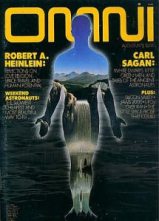 George R. R. Martin’s Sandkings, which won the Nebula Award and the Hugo Award (1980) for best novelette
George R. R. Martin’s Sandkings, which won the Nebula Award and the Hugo Award (1980) for best novelette
George R. R. Martin’s The Way of Cross and Dragon, which won the Hugo Award for best short story (1980)
Orson Scott Card’s Unaccompanied Sonata
Roger Zelazny’s The Last Defender of Camelot, which won the (ironically referred to as coveted) Balrog Award for short fiction (1980)
Edward Bryant’s giANTS, which won the Nebula Award for best short story.
Ted Reynolds’ Can These Bones Live?
Connie Willis’ Daisy, In the Sun
.
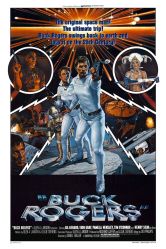 Some of the Movies/TV shows of 1979:
Some of the Movies/TV shows of 1979:
Buck Rogers in the 25th Century. A short-lived, cheesy TV show (2 seasons: 1979-1981)
Salem’s Lot, a TV miniseries based on Stephen King’s novel.
Star Trek: The Motion Picture. I have to disagree with the prevailing opinion; as science fiction, this is a much better film than The Wrath of Khan, which has some embarrassingly bad ham acting (in particular, from William Shatner and Ricardo Montalban).
Alien, the first of a movie franchise. Not my favourite sub-genre, but fairly well done for a movie with a science fiction premise.
Mad Max, a movie that spawned two additional apocalyptic ‘Mad Max’ features.
Some of the notable novels of 1979:
Arthur C. Clarke’s The Fountains of Paradise, which won the Hugo Award (1980) and the Nebula Award. This story describes the construction of an orbital tower (a space elevator) from ground level to a satellite in geosynchronous orbit. I enjoyed the novel when I was younger, but couldn’t manage to re-read it recently. One of my biggest disappointments in life is re-reading some of the authors I loved when I was young and discovering that their writing no longer appeals to me…
Orson Scott Card’s A Planet Called Treason; I re-read this recently and was amazed at what a mishmash it is. There are some fascinating concepts (which is what I remember from reading it years ago), but I found it difficult to battle through the muddled story.
John Varley’s Titan, which won the Locus Award, and was the first book in his Gaea Trilogy (followed by Wizard and Demon, neither of which I’ve read). I enjoyed the beginning of Titan, but I thought it ended up as a mess. The story concerns a human expedition to Saturn, where sentient life is discovered: the Titanides, a centaur-like species, and the Angels, a humanoid-bird-like species. The Titanides and the Angels war against each other for no apparent reason (although this is explained later in the novel). Eventually, a higher intelligence, Gaea, is discovered and the plot becomes very strange. I give Varley marks for creativity, but I think the novel stretched beyond his ability to control the story (maybe the other two books in the trilogy helped define the story, but I’ll probably never read them. Perhaps it is my loss…).
John Crowley’s Engine Summer. There are some beautifully written passages in the novel, but it didn’t pull me in and, ultimately, left me empty. It is set in a post-apocalyptic future as narrated by a young man called Rush that Speaks. The novel is an intriguing coming-of-age story, but there is much that remains unclear. I enjoy challenging books, but this one lost me. 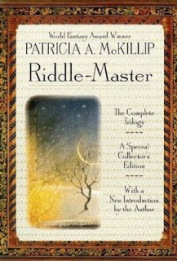
Patricia McKillip’s Harpist in the Wind, the final book in her Riddle-Master trilogy (which also includes The Riddle-Master of Hed and Heir of Sea and Fire. The series is currently available in a single volume: Riddle-Master: The Complete Trilogy). I read this trilogy several years ago and I thought it was a pretty darned good series, a few levels above the standard fantasy schlock.
Thomas M. Disch’s On Wing’s of Song, which won the Campbell Memorial Award (1980). It is a dystopian novel set in a fractured and economically unstable USA. The book is a bildungsroman, following the protagonist, Daniel Weinreb, from the age of five, until the end of his days. The book reveals an unusual, multifaceted society. An apparatus has been invented that people connect to and sing; if a person sings earnestly and perfectly, they experience an out-of-body experience that is referred to as flying. Flying is similar to the drugs of our day; prohibited (by the undergodders), but readily accessible. It is an unusual book and cannot be easily described without excessive explanations and plot spoilers. I didn’t fully appreciate the novel, but Disch’s stories are usually interesting, and this is no exception.
Watchtower, by Elizabeth Lynn, which won the World Fantasy Award. Watchtower is the first book in The Chronicles of Tornor. I haven’t read any of the books, but they are well-respected. The author is an openly lesbian writer and this novel was one of the first fantasy books to highlight gay relationships sympathetically and as commonplace cultural phenomena.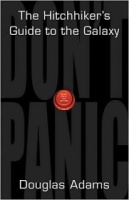
Douglas Adams’ The Hitchhikers Guide to the Galaxy, which is now a classic. I was introduced to this series through the TV episodes, but enjoyed the books even more; in fact, I often chortled out-loud while reading them. My only wish is that he had stopped after the fourth book (So Long and Thanks for All the Fish); the fifth book (Mostly Harmless) was entertaining, but I think the fourth one ended ‘just right’ (and I have no intention of reading Eoin Colfer’s And Another Thing). The first book in the series, The Hitchhikers Guide to the Galaxy, introduced my favourtie character in the series, Slartibartfast.
Octavia Butler’s Kindred, which is possibly her most notable novel, but I haven’t read it (shame on me) and cannot provide an interpretation; however, in an interview, Ms. Butler said, “I was trying to get people to feel slavery. I was trying to get across the kind of emotional and psychological stones that slavery threw at people.”
.
And my choice for the Retrospeculative novel of 1979 is…
.
Tales of Nevèrÿon, by Samuel R. Delany. This is the first book in a four book series, Return to Nevèrÿon, which is best considered as a single work. The entire series is getting my Retrospeculative nod…
The first book in the series, Tales of Nevèrÿon,consists of five parts, the first two of which are long stories, and the remaining three are short pieces.
The Tale of Gorgik introduces the reader to Gorgik; as a boy, he is taken into slavery, but eventually freed. The story has a circular resonance, as does the entire series. The Tale of Old Venn is mainly a discourse between an old woman, Venn, and a young girl, Norem. Venn explains the influence that money and language have on culture; as Norem listens, she is influenced by the language of Venn’s discourses. The Tale of Small Sarg relates the story of a prince who is taken as a slave and eventually bought by Gorgik. The Tale of Potters and Dragons relates the story of two young people who set out on a quest for wealth. In The Tale of Dragons and Dreamers, Sarg battles slave owners.
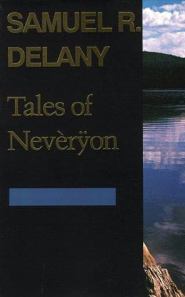 If you enjoy Tales of Nevèrÿon, you will enjoy the series, as a whole, even more.
If you enjoy Tales of Nevèrÿon, you will enjoy the series, as a whole, even more.
The Nevèrÿon books contain adventure and magic, but the series is not plot driven; it is about the power and influence of language, sex, social behavior and money. Delany wields words like a master as he regales us with postmodern sword and sorcery involving slavery, sex, and symbolism. The Nevèrÿon series is metafiction, requiring careful attention (in certain respects, I found it similar to Gene Wolfe’s The Book of the New Sun). I don’t think I’m giving anything away if I point out that the last tale in the series is The Tale of Gorgik, the same story that begins the series, completing the cyclic nature of the tales. After finishing the series, The Tale of Gorgik reveals much more than it did upon the first reading.
Highly recommended for anybody who enjoys a challenging, intellectual reading experience (and the books are now available with adult-friendly covers from Wesleyan University Press).
I couldn’t possibly end this post without mentioning Delany’s Informal Remarks Toward the Modular Calculus (hereafter referred to as IRTMC). If you’re interested, I suggest you research G. Spenser-Brown’s Laws of Form; I claim no degree of knowledge regarding G. Spenser-Brown’s works, but for anyone interested, I’ve provided some links at the bottom of this post.
In an essay (The Jewel Hinged Jaw: Notes on the Language of Science fiction, p. 65) Delany writes: “…sword and sorcery represents what can still be imagined about the transition between a barter economy and a money economy,” and “…science fiction represents what can be most safely imagined about the transition from a money economy to a credit economy.” Delany also associates these representations with a note from G. Spencer-Brown’s Laws of Form (part mathematics, part epistemology, which Delany calls “…a manifestation of the abstract calculus he is creating…”), which asserts (again, from Delany’s essay) “…that the value of content is reversed by its image; but to go on to an image of an image gives us a new image to deal with.” G. Spencer-Brown’s Laws of Form surely form the foundation for Delany’s Informal Remarks Toward the Modular Calculus (IRTMC)
Delany’s Trouble on Triton, a science fiction novel, apparently functions as a prologue for the Nevèrÿon series and contains the first two parts of the IRTMC: the novel is Part One and the novel’s second appendix is Part Two. Part Three of the IRTMC is Tales of Nevèrÿon’s first appendix (purportedly written by ‘S.L. Kermit’). Part Four of the IRTMC is the novel Neveryóna (the second book in the series). Part Five of IRTMC is the novella The Tale of Plagues and Carnivals, the ninth tale in the Nevèrÿon series, in which a fatal STD breaks out in Nevèrÿon (very similar to AIDS, and there are echoes and crossovers with scenes in New York near the beginning of the AIDS epidemic).
For more on G. Spencer-Brown’s ideas:
An Exploration in Mathematics and Foundations
For more from Samuel R. Delany:
I highly recommend Stars in My Pocket, Like Grains of Sand, and cautiously recommend Dhalgren; both are excellent, but Dhalgren is quite a different beast. I also recommend his book of essays, The Jewel Hinged Jaw: Notes on the Language of Science Fiction, an exceptional, literate book of criticism.
An interview with Samuel R. Delany
.
.
.
